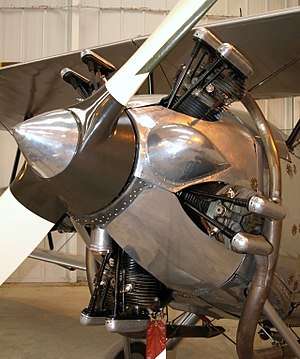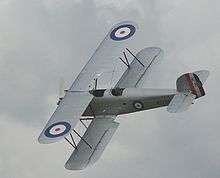Armstrong Siddeley Mongoose
The Armstrong Siddeley Mongoose is a British five-cylinder radial aero engine produced by Armstrong Siddeley. Developed in the mid-1920s it was used in the Hawker Tomtit trainer and Parnall Peto seaplane amongst others. With a displacement of 540 cubic inches (9 litres) the Mongoose had a maximum power output of 155 horsepower (115 kilowatts).
| Mongoose | |
|---|---|
 | |
| Armstrong Siddeley Mongoose fitted to the Shuttleworth Collection's airworthy Hawker Tomtit | |
| Type | Radial engine |
| National origin | United Kingdom |
| Manufacturer | Armstrong Siddeley |
| First run | 1926 |
| Major applications | Hawker Tomtit Avro 504N |
| Developed into | Armstrong Siddeley Serval |
A Mongoose engine powers the sole remaining airworthy Hawker Tomtit, based at Old Warden.
Design and development
The Mongoose is a five-cylinder, single-row, air-cooled radial piston engine. The engine features twin forward-mounted ignition magnetos and enclosed valve rockers, the cylinders being the same as those used for the earlier Jaguar engine.[1] An unusual feature of the Mongoose is the vertical position of the lower cylinder, a design thought likely to promote oil fouling of the spark plugs.[2]
Built in several variants, power output ranged between 135 and 155 hp (100-115 kW).
Variants
- Mongoose I
- 1926, 135 hp.
- Mongoose II
- 1930, 155 hp.
- Mongoose III
- 1929.
- Mongoose IIIA
- 1929, civil use.
- Mongoose IIIC
- 1929, Military use based on IIIA.
Survivors
An Armstrong Siddeley Mongoose IIIC powers the sole remaining airworthy Hawker Tomtit, K1786/G-AFTA, owned and operated by the Shuttleworth Collection this aircraft flies regularly throughout the summer months.[4]
Specifications (Mongoose I)
General characteristics
- Type: 5-cylinder single-row radial
- Bore: 5 in (127 mm)
- Stroke: 5.5 in (139.7 mm)
- Displacement: 540 cu in (8.8 L)
- Length: 36.6 in (93 cm)
- Diameter: 45.6 in (116 cm)
- Dry weight: 340 lb (154 kg)
Components
- Valvetrain: Overhead poppet valves
- Fuel type: 77 Octane petrol
- Cooling system: Air-cooled
- Reduction gear: Direct drive, left-hand tractor
Performance
- Power output: 138 hp (103 kW) at 1,750 rpm at sea level
- Compression ratio: 5:1
- Power-to-weight ratio: 0.4 hp/lb (0.67 kW/kg)
References
Notes
- Gunston 1989, p. 18.
- Lumsden 2003, p. 69.
- List from Lumsden
- The Shuttleworth Collection - Hawker Tomtit Retrieved: 22 February 2012
- Lumsden 2003, Part 4.
Bibliography
- Gunston, Bill. World Encyclopaedia of Aero Engines. Cambridge, England. Patrick Stephens Limited, 1989. ISBN 1-85260-163-9
- Lumsden, Alec. British Piston Engines and their Aircraft. Marlborough, Wiltshire: Airlife Publishing, 2003. ISBN 1-85310-294-6.
External links
| Wikimedia Commons has media related to Armstrong Siddeley Mongoose. |
